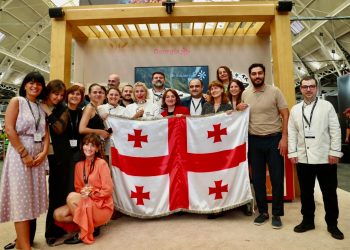INTERVIEW
Dimitri (Dito) Arindauli runs the wool processing enterprise “Tusheti” located in Zemo Alvani. It might not sound like much, until you are told that this enterprise is one of a kind in Georgia, supplying raw materials to local producers, where about 40 tons of wool is processed per season.
The problem of Tushetian wool processing arose after the collapse of the Soviet Union. Earlier, this precious raw material was exported to Russia. From the 1990s, it was simply thrown away or burned because they were unable to process it. The Arindaulis are the pioneers of their trade: back in 2005, Dito’s father, Gogi Arindauli, established the first Tushetian wool processing plant in Georgia, where he started processing a small portion of local wool and producing yarn from it. Today, his son runs the enterprise, and in 2014, with the support of the Czech Development Agency and the Czech Caritas in Georgia, the business was expanded through the addition of necessary equipment for processing. “Tusheti” currently employs 10 people. The wool washing line and drying workshop are already operational, allowing them to fully exploit locally produced wool and also serve shepherds and wool exporters from other regions.
Arindauli himself is a man on a mission: he aims to restore Tushetian wool to its former glory. As he sits down with GEORGIA TODAY to talk about it, you can see this has not been an easy path to thread.
“As I am from Tusheti, and we dealt with wool as a tradition, I started learning the craft,” he tells us. “Then it gradually became my profession. Initially, we provided our services only to locals. We sewed wool mattresses, blankets; there was demand for tread and felt. As business slowly but surely became steadier and we got a good reputation for providing quality products, we thought about expanding, developing. We started buying machinery tools. We have a spinning line that can produce 200-220 kilos of yarn per day, but we had a problem with washing.”
Why?
We used to wash around 50-60 kilos per day. However, the demand for wool was growing, the tourism in the country was growing, there were orders and we couldn’t manage to fill them: it sometimes took us a month to do so. In addition, the wool has its own fat content. If we don’t remove it, it won’t get through the machines. There was no wool laundry in this region to go to and buy washed wool. Then there appeared the Czech Caritas project. They told us to look into finding a wool washing machine somewhere. We found one and I bought it, then we built the infrastructure, but first, the knowledge was needed. Just an idea is nothing: you need to know how and what to do. As a point of interest, the Czech government researched the situation in Europe concerning wool, because at first we thought to export processed-washed wool to Europe. According to the study by Czech specialists, washed wool is very cheap and it wasn’t worth working in this direction, so we were advised to instead focus on semi-processed products. With the help of the Czech government, I can now wash from 500 to 800 kilos of wool without any problem. Even if I work for a week, I already have winter supplies and I’m insured against all kinds of low-quality products.

So if you have a supply of 15 – 20 tons of washed wool in the winter, when the temperature drops to -5-10, you carry on working?
Yes, the weather can be quite punishing here, but I have dried, washed wool stored by that period and we just work on the machines. Our wool is pure shawl, with no admixtures, which is then processed with natura dyes, and is used, for example, in rugs and carpets. The knitters themselves use natural dyes too.
Do you still make mattresses and blankets?
We make felt and felt cloaks, but our main specialization is the production of knitted thread of pure wool which is sold throughout Georgia, in special shops and workshops. There are special weavers who create products for tourists.
* * *
Those visiting the enterprise have the opportunity to learn about the different stages of wool processing: wool clearing, washing, dyeing, scotching and threading. In addition, one can purchase yarn and wool on-site. In this way, Dito Arindauli makes a special contribution to the maintenance of this craft and the production of natural wool.
By Vazha Tavberidze













